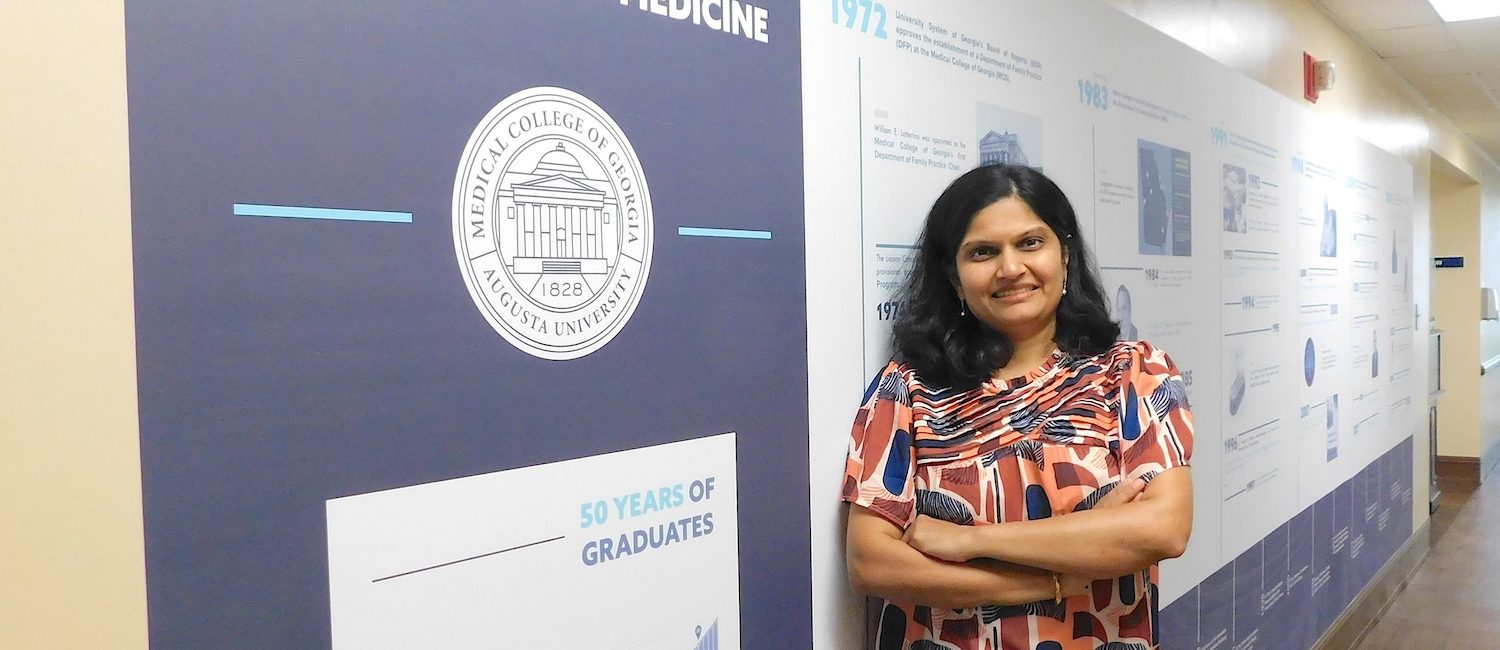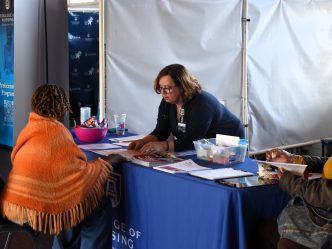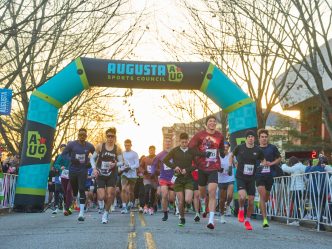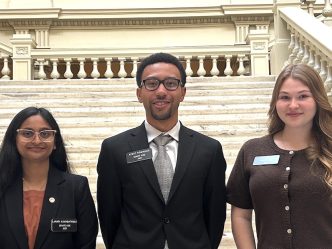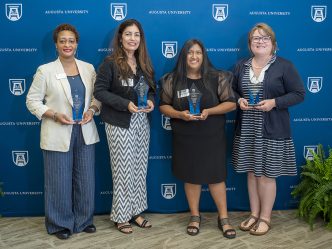Approximately 120 of Georgia’s 159 counties are designated as rural, according to the Georgia Department of Community Health.
As the first primary care rural health fellow in the Department of Family and Community Medicine of the Medical College of Georgia at Augusta University, Amrita Jariwala said her recent experience working in rural Georgia was eye-opening.
“This past year, I was working with the Community Health Center Systems in Sandersville and Tennille, Georgia,” Jariwala said. “I have an extensive background in anesthesia and critical care, but this was a very different experience for me. In these rural places, what I observed is there is an older population. Probably about 80% of the patients I saw were 60 years of age or older.”
These older, rural populations have a lot of comorbidities – problems such as high blood pressure, diabetes, obesity and chronic lung disease, which can make the population more vulnerable if these conditions are not properly addressed, Jariwala said.
“This is what makes these kinds of fellowships so important,” Jariwala said. “Sandersville is about one hour and 20 minutes away from Augusta, and the patients there really appreciated me coming to see them. They needed help.”
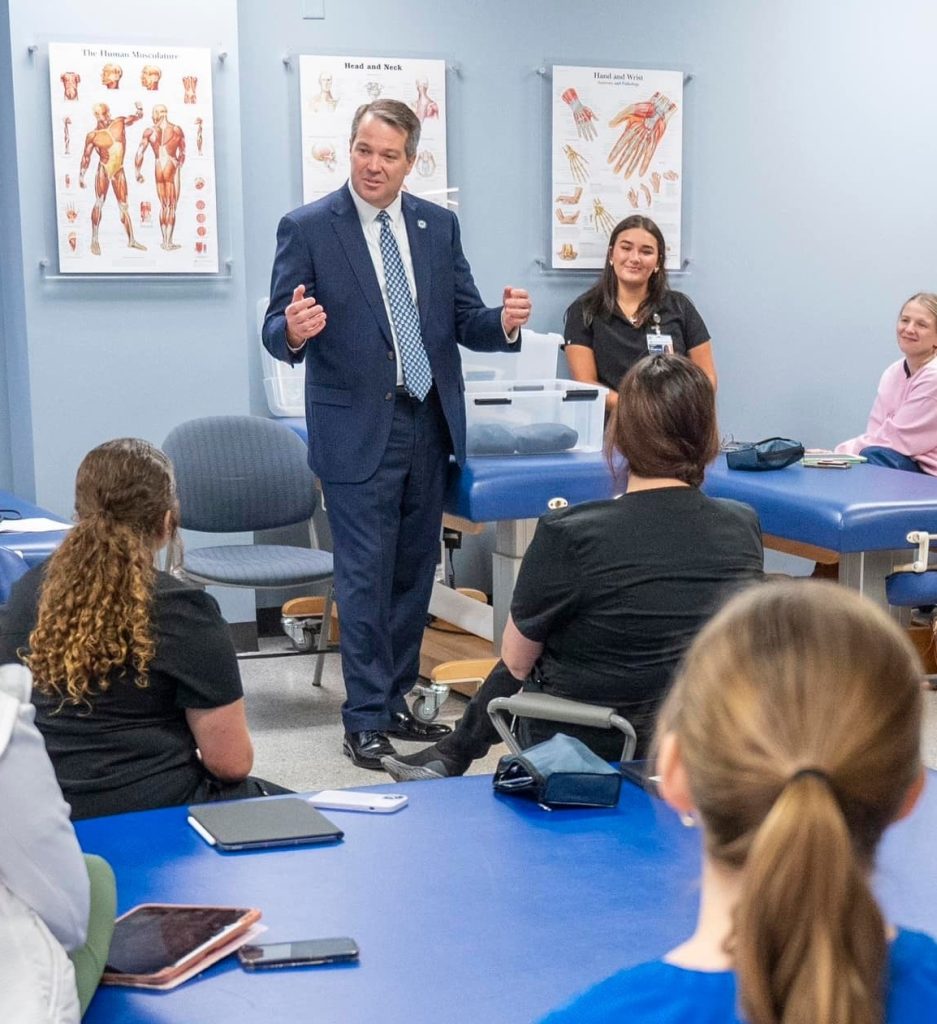
“These fellowships are a direct investment in the health of Georgians. They empower our medical residents to sharpen their clinical expertise, broaden their skill sets and drive innovation in patient care, especially in the areas of our state that need it most.”
Augusta University President Russell T. Keen
The Community Health Center Systems coordinates with centers across Georgia to treat patients in small cities such as Gray, Crawfordville, Sparta, Wrightsville, Wrens and Gibson, Jariwala said.
“While Sandersville is a small town, it is considered quite a big place in that region,” she said. “Many of the patients I saw were from much smaller neighboring counties and towns.”
Jariwala recently began working at Wellstar MCG Health Medical Center in Augusta, but she said her recent fellowship opened her mind to a possible future career in rural medicine.
“It was clear that the doctors and the attendings share a bond with their patients in these close-knit communities,” she said. “They know everything about the patients and their families. It is a strong bond.”
Augusta University President Russell T. Keen said such fellowships at Augusta University are crucial for specialized medical training, offering advanced knowledge and skills.
“These fellowships are a direct investment in the health of Georgians,” Keen said. “They empower our medical residents to sharpen their clinical expertise, broaden their skill sets and drive innovation in patient care, especially in the areas of our state that need it most.
“We are deeply grateful to the governor and the Georgia General Assembly for recognizing the critical importance of these fellowships,” he added. “Their support strengthens Georgia’s health care workforce and affirms their commitment to Augusta University’s mission of advancing health care statewide.”
Breaking records with residents and fellows at MCG
Julie Dahl-Smith, DO, the vice chair of education in the Department of Family and Community Medicine at the Medical College of Georgia, said the purpose of the rural health fellowship is to provide more hands-on experience to family medicine physicians who are considering working in rural areas.
“In these areas, it is very hard for patients to get specialty care,” Dahl-Smith said. “A lot of times with rural health patients, they don’t have transportation, or they must travel two hours away, and they don’t want to take off work, so their condition might worsen. This rural health fellowship gives our students extra tools to see what these patients are facing.”
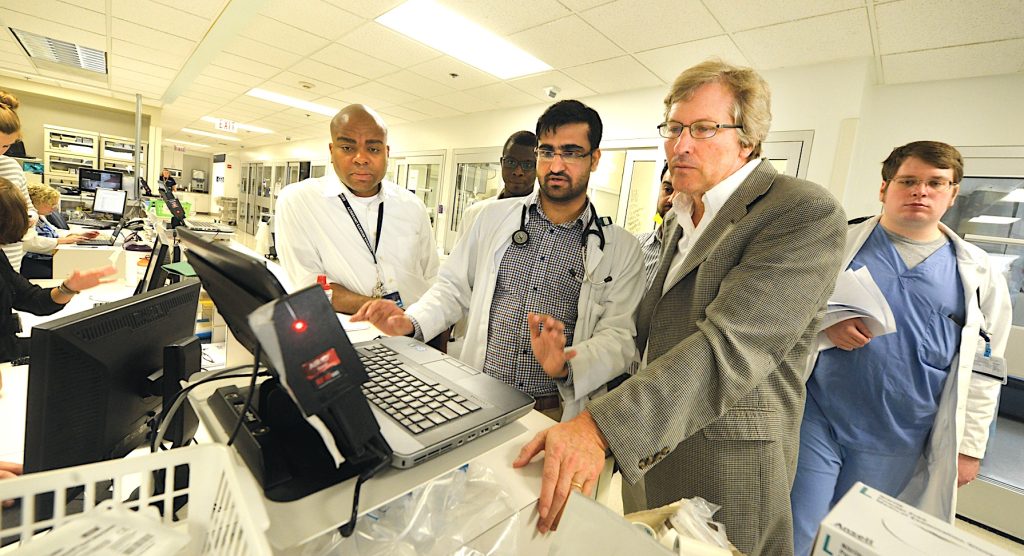
“Residents and fellows are key to attracting and retaining more doctors in Georgia. Graduate medical education programs are how you really create physicians for the state. More residents training here, means we have more doctors to practice here.”
David Hess, MD, interim executive vice president of research and innovation and dean of the Medical College of Georgia
Fellowships in Georgia also encourage medical students and residents to remain in the state to practice medicine, Dahl-Smith said.
“If a fellow does the fellowship in the state, statistics say they’re more likely to stay in the state,” Dahl-Smith said. “That is really important because Georgia is so underserved. We need our primary care physicians and there are shortages in all of Georgia’s rural areas. There are some areas that have no physicians whatsoever for miles and miles away. These kinds of fellowships can help attract and retain physicians in Georgia.”
Dahl-Smith emphasized how fellowships can be a powerful tool for addressing Georgia’s physician shortages, especially in rural communities. That urgency is reflected in the growing momentum at MCG, where David C. Hess, MD, interim executive vice president of research and innovation and dean of the Medical College of Georgia, recently announced the largest cohort of residents and fellows in the school’s history.
“We have consistently trained around 585 residents and fellows each year,” Hess said. “The great news this year is we have our largest group ever – with 611 residents and fellows across our medical school and health system. Residents and fellows are key to attracting and retaining more doctors in Georgia. Graduate medical education programs are how you really create physicians for the state. More residents training here means we have more doctors to practice here.”
Filling in the gaps
Christopher Johnson, MD, recently completed his 12-month sports medicine fellowship with MCG’s Department of Family and Community Medicine. After attending medical school in Nashville, Tennessee, Johnson completed his residency in Washington, D.C.
“During my residency, that’s when I actually started thinking about going into sports medicine,” Johnson said. “My first experience in the field was doing musculoskeletal ultrasound. I always had an interest in musculoskeletal health.”
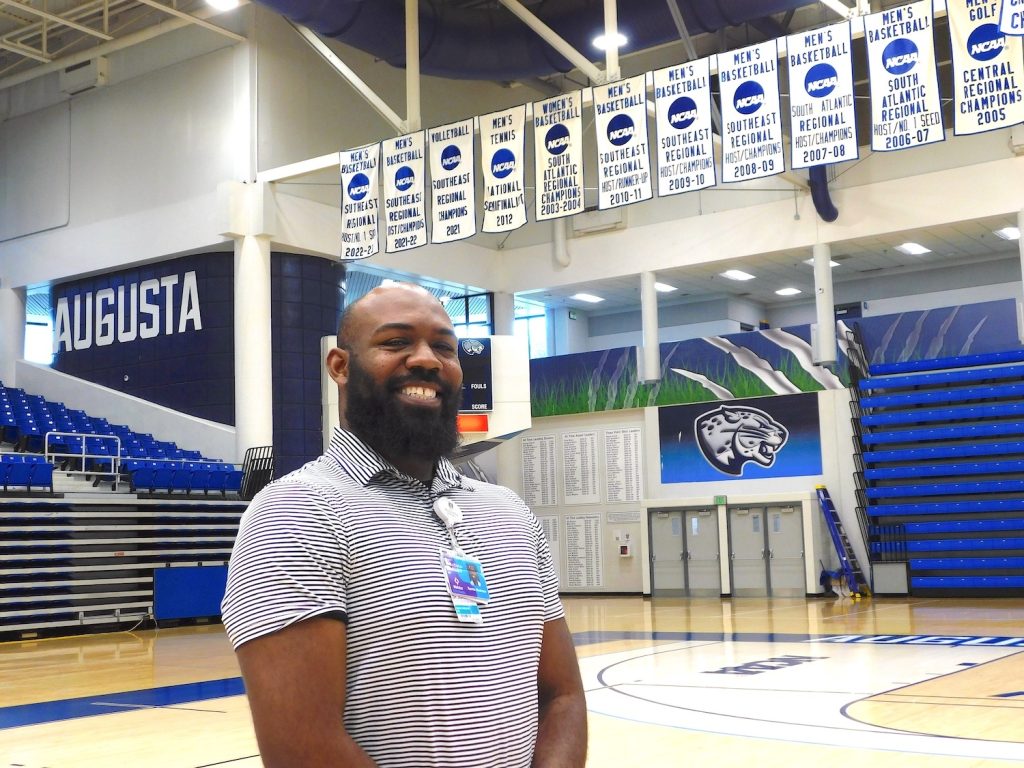
“When I was younger, I remember my granddad fell and broke his clavicle. We had to go to Tallahassee, Florida, all the way across state lines, just to get an orthopedic doctor to help him. That experience showed me how there are just not a lot of doctors out in these rural communities.”
Christopher Johnson, MD, who recently completed his 12-month sports medicine fellowship with the Department of Family and Community Medicine
Growing up in Augusta, Johnson was grateful to be close enough to a medical center if he needed help. His grandfather was not so fortunate.
“When I was younger, I remember my granddad fell and broke his clavicle, but there was not a sports medicine orthopedic doctor in his little town that he lived in, in south Georgia,” Johnson said. “They didn’t even have an X-ray machine at his regional emergency room. So, we had to go to Tallahassee, Florida, all the way across state lines, just to get an orthopedic doctor to help him.
“That experience showed me how there are just not a lot of doctors out in these rural communities,” he said. “But you have these specializations, like people in sports medicine, who are now actually able to go out to these smaller areas, and they’re able to do diagnoses and refer patients to orthopedic surgeons when it’s necessary for bigger procedures.”
During his sports medicine fellowship at Augusta University, Johnson learned the impact of having the ability to do a quick ultrasound on a patient with muscular or bone issues, Johnson said.
“A lot of times, in order to see the pathology of a patient, you need an MRI, which is super expensive, or a CT scan, which is radiation,” he said. “Both cost a lot of money, and it also takes time. You can’t just order an MRI today and get the MRI today. It takes weeks sometimes.”
Augusta University offers an ultrasound clinic that allows Johnson to learn by working with actual patients.
“I was able to put an ultrasound right up to the area and see what’s going on,” he said. “And I can carry around the ultrasound machine, set up shop anywhere, scan it really quickly and say, ‘OK, I think you have this.’ And if I think the patient needs an MRI, they can still get the MRI or the CT, but if they don’t, then I can at least rule it out.”
Keeping Georgia active and healthy
Chris Ledford, MD, the director of the sports medicine fellowship at AU, said rural areas of Georgia are in desperate need of musculoskeletal experts.
“In family medicine, we prepare our residents to take care of all conditions that a patient might show up with at the office,” Ledford said. “In the primary care sports medicine fellowship, we look to solidify and advance those skills and education that they need to be the experts in nonoperative care of musculoskeletal injuries, as well as the conditions that typically show up in active individuals related to sports injuries, such as concussions.”
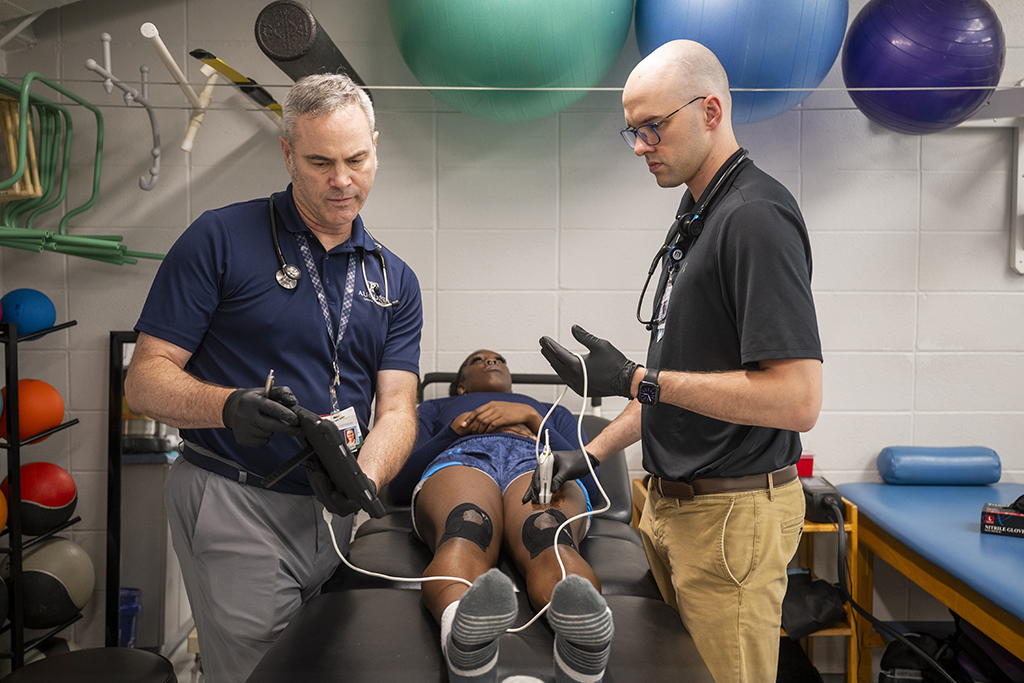
“Our graduates are prepared to fill in a lot of health care gaps in terms of physical therapy and occupational therapy.”
Chris Ledford, MD, director of the sports medicine fellowship at Augusta University
The goal in sports medicine is to get all patients more active in general, but also to keep those who are extremely active performing at their highest level, he said.
“Our graduates are prepared to fill in a lot of health care gaps in terms of physical therapy and occupational therapy,” Ledford said. “Not that they themselves are performing in lieu of a physical therapist or occupational therapist, but they can connect a patient with resources that would allow someone living in a rural county in Georgia to return to their manual labor job or to return to their agricultural job. That’s the role of primary care sports medicine fellowships in the state of Georgia particularly, but also in the broader context of primary care health in the nation.”
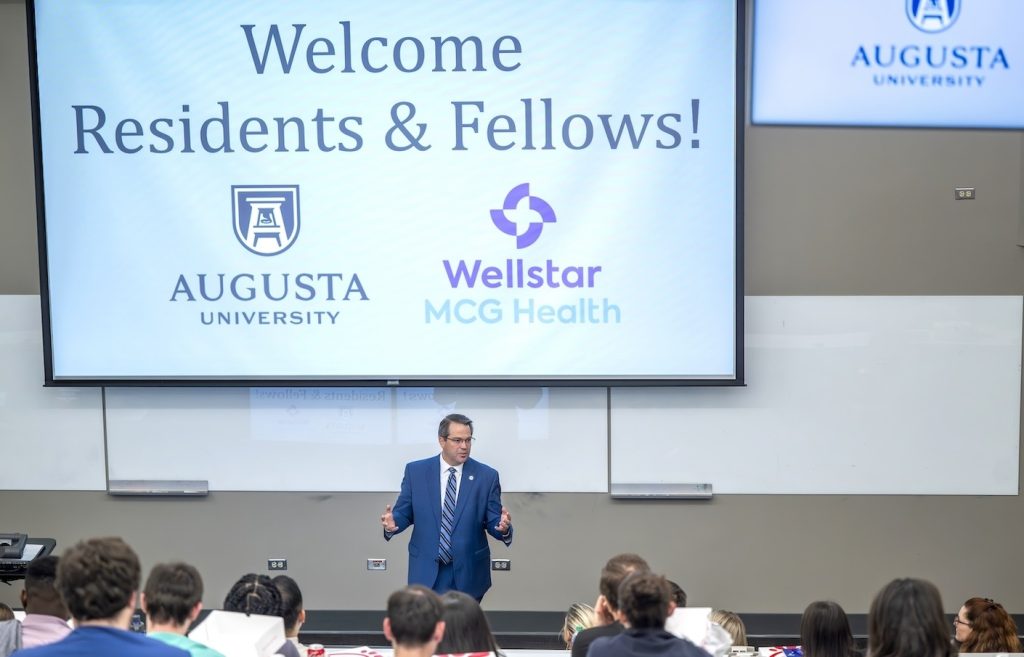
“We are deeply grateful to the governor and the Georgia General Assembly for recognizing the critical importance of these fellowships. Their support strengthens Georgia’s health care workforce and affirms their commitment to Augusta University’s mission of advancing health care statewide.”
AU President Russell T. Keen
During his fellowship at AU, Johnson said he was also able to regularly perform musculoskeletal injections and learn to properly diagnose injuries.
“I also worked in the community with the men’s and women’s basketball teams at AU and helped out in the training room with all the sports teams, including track and field, golf, the softball team, the baseball team, cheer and dance team and the volleyball team,” he said. “I also helped some of the high school sports teams around town including Cross Creek, Academy of Richmond County, Hephzibah and Glenn Hills high schools.
“Needless to say, this has been a tremendous fellowship,” Johnson added. “I’m really happy to be able to come back to my hometown of Augusta and do my fellowship here. It’s been like a blur of a year, but I’ve learned so much.”
 Augusta University
Augusta University
